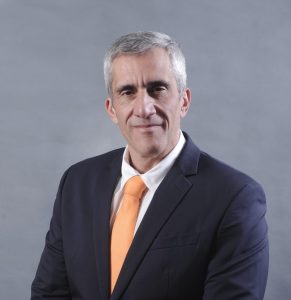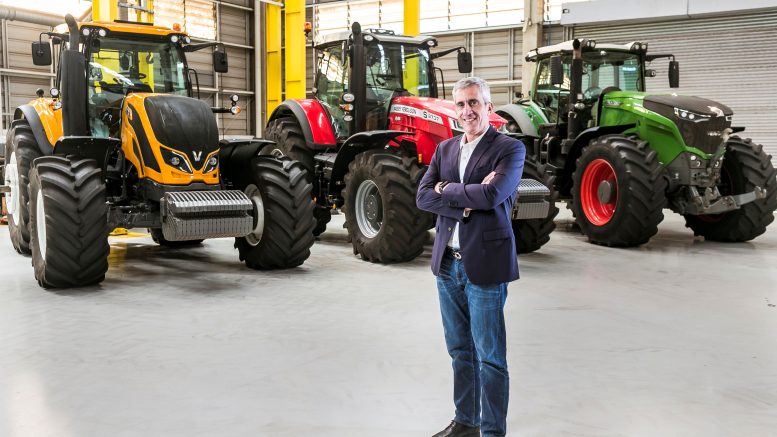“…o Brasil se manteve resiliente, com crescimento em unidades vendidas, especialmente de tratores…”
Rodrigo Junqueira é gerente-geral da AGCO e vice-presidente da Massey Ferguson América do Sul, engenheiro Agrônomo pela USP, com MBA em Marketing pela ESPM e especialização no Programa para Desenvolvimento de Executivos pela Fundação Dom Cabral e Kellogg School of Management.

Rodrigo Junqueira, AGCO
AgriBrasilis – Por que houve retração global no setor de máquinas agrícolas?
Rodrigo Junqueira – O mercado global de máquinas agrícolas passou por um período de retração, impactado principalmente por fatores macroeconômicos, variações nas commodities e ajustes nos estoques de equipamentos. No entanto, o Brasil se manteve resiliente, com crescimento em unidades vendidas, especialmente de tratores, devido à necessidade de aumentar a produtividade sem ampliar a área cultivada.
O país segue com papel estratégico global, principalmente por seu potencial de colher até três safras por ano. Além disso, o agronegócio brasileiro é responsável pela alimentação de cerca de 800 milhões de pessoas em todo o mundo, o que reforça sua importância no cenário global.
AgriBrasilis – Qual a previsão para recuperação do mercado?
Rodrigo Junqueira – A recuperação deve ocorrer de forma gradual. Para o Brasil, o cenário é positivo, com expectativa de retomada consistente, impulsionada por boas safras e investimentos em tecnologias que aumentam a produtividade e reduzem custos operacionais.
Segundo dados da Associação Brasileira da Indústria de Máquinas e Equipamentos – Abimaq, as vendas internas de tratores e colheitadeiras cresceram 47,1% em agosto de 2025 em relação ao mesmo período de 2024. A expectativa é de um aumento anual entre 6% e 10%. Esse cenário mais equilibrado tem estimulado novos investimentos, especialmente em segmentos como cana-de-açúcar, citros, café e pecuária, que seguem aquecidos.
A AGCO mantém uma visão otimista e planeja lançar ao menos três soluções inovadoras por ano, com foco em agricultura de precisão, conectividade e tecnologias limpas.
AgriBrasilis – Quais os impactos do “tarifaço” dos EUA para o setor?
Rodrigo Junqueira – A imposição de tarifas de 50% sobre produtos brasileiros exportados para os Estados Unidos representa um desafio para o comércio internacional. No entanto, a AGCO atua como uma empresa global, presente em diversas regiões, o que permite flexibilidade para mitigar os impactos dessas medidas. Trabalhamos continuamente na construção de cenários e na adoção de ações preventivas para minimizar efeito ao cliente final. Nosso compromisso é no agricultor, trabalhamos para garantir que o produtor rural continue tendo acesso aos produtos, serviços e peças com a mesma eficiência.
“…a substituição completa do diesel ainda depende de fatores como infraestrutura, logística e…”
AgriBrasilis – Muitos sistemas de telemetria e sensores ficam subutilizados no campo. Existe “excesso de tecnologia”?
Rodrigo Junqueira – A tecnologia é uma ferramenta estratégica que permite monitorar o desempenho das máquinas, otimizar insumos e aumentar a produtividade. A digitalização exige que o produtor saiba como tirar o máximo proveito desses recursos. Por meio da PTx, a AGCO vem investindo fortemente em soluções que simplifiquem o acesso e a integração dos dados para conectar equipamentos de qualquer marca e ajudar a transformar dados em decisões práticas e eficientes. Acreditamos que o futuro da produtividade está em utilizar a informação de forma simples, acessível e mensurável.
AgriBrasilis – O etanol de milho está realmente a caminho de substituir o diesel?
Rodrigo Junqueira – O etanol de milho é uma alternativa promissora, especialmente no contexto de busca por soluções mais limpas e sustentáveis. Porém, a substituição completa do diesel ainda depende de fatores como infraestrutura, logística e adaptação tecnológica. O mercado caminha para diversificação de fontes de energia, mantendo foco em eficiência e redução do impacto ambiental.
AgriBrasilis – O que ainda impede que os tratores elétricos sejam mais adotados no agro?
Rodrigo Junqueira – Os principais desafios são autonomia da bateria, custo inicial e disponibilidade de infraestrutura de recarga. A tecnologia existe, mas para expansão em larga escala no campo brasileiro, é necessário alinhamento entre inovação, demanda e viabilidade econômica. O setor segue investindo em soluções limpas, conectadas e sustentáveis, equilibrando inovação e realidade operacional.
LEIA MAIS:

